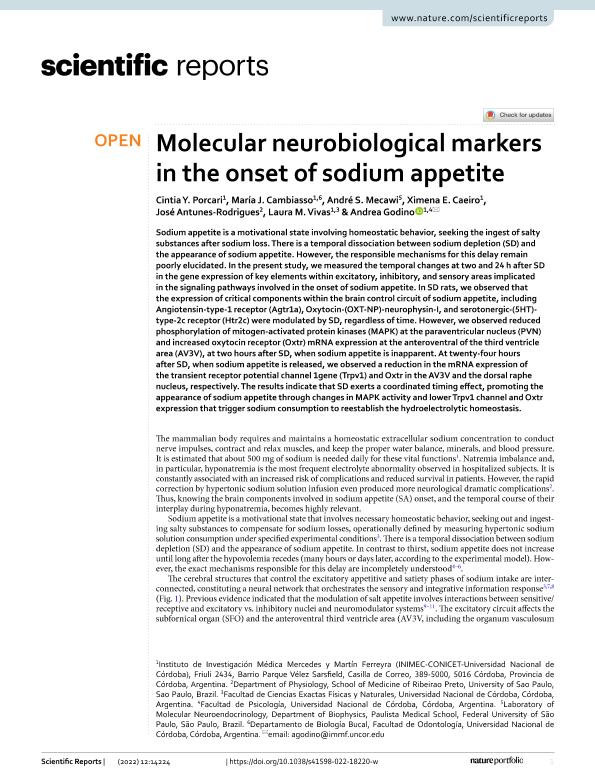Artículo
Molecular neurobiological markers in the onset of sodium appetite
Porcari, Cintia Yamila ; Cambiasso, Maria Julia
; Cambiasso, Maria Julia ; Mecawi, André S.; Caeiro, Ximena Elizabeth
; Mecawi, André S.; Caeiro, Ximena Elizabeth ; Antunes Rodrigues, José; Vivas, Laura Marta
; Antunes Rodrigues, José; Vivas, Laura Marta ; Godino, Maria Andrea del Milagro
; Godino, Maria Andrea del Milagro
 ; Cambiasso, Maria Julia
; Cambiasso, Maria Julia ; Mecawi, André S.; Caeiro, Ximena Elizabeth
; Mecawi, André S.; Caeiro, Ximena Elizabeth ; Antunes Rodrigues, José; Vivas, Laura Marta
; Antunes Rodrigues, José; Vivas, Laura Marta ; Godino, Maria Andrea del Milagro
; Godino, Maria Andrea del Milagro
Fecha de publicación:
12/2022
Editorial:
Nature Research
Revista:
Scientific Reports
e-ISSN:
2045-2322
Idioma:
Inglés
Tipo de recurso:
Artículo publicado
Clasificación temática:
Resumen
Sodium appetite is a motivational state involving homeostatic behavior, seeking the ingest of salty substances after sodium loss. There is a temporal dissociation between sodium depletion (SD) and the appearance of sodium appetite. However, the responsible mechanisms for this delay remain poorly elucidated. In the present study, we measured the temporal changes at two and 24 h after SD in the gene expression of key elements within excitatory, inhibitory, and sensory areas implicated in the signaling pathways involved in the onset of sodium appetite. In SD rats, we observed that the expression of critical components within the brain control circuit of sodium appetite, including Angiotensin-type-1 receptor (Agtr1a), Oxytocin-(OXT-NP)-neurophysin-I, and serotonergic-(5HT)-type-2c receptor (Htr2c) were modulated by SD, regardless of time. However, we observed reduced phosphorylation of mitogen-activated protein kinases (MAPK) at the paraventricular nucleus (PVN) and increased oxytocin receptor (Oxtr) mRNA expression at the anteroventral of the third ventricle area (AV3V), at two hours after SD, when sodium appetite is inapparent. At twenty-four hours after SD, when sodium appetite is released, we observed a reduction in the mRNA expression of the transient receptor potential channel 1gene (Trpv1) and Oxtr in the AV3V and the dorsal raphe nucleus, respectively. The results indicate that SD exerts a coordinated timing effect, promoting the appearance of sodium appetite through changes in MAPK activity and lower Trpv1 channel and Oxtr expression that trigger sodium consumption to reestablish the hydroelectrolytic homeostasis.
Palabras clave:
SODIUM APPETITE
,
SEROTONIN
,
ANGIOTENSIN
,
TPRV1
Archivos asociados
Licencia
Identificadores
Colecciones
Articulos(INIMEC - CONICET)
Articulos de INSTITUTO DE INV. MEDICAS MERCEDES Y MARTIN FERREYRA
Articulos de INSTITUTO DE INV. MEDICAS MERCEDES Y MARTIN FERREYRA
Citación
Porcari, Cintia Yamila; Cambiasso, Maria Julia; Mecawi, André S.; Caeiro, Ximena Elizabeth; Antunes Rodrigues, José; et al.; Molecular neurobiological markers in the onset of sodium appetite; Nature Research; Scientific Reports; 12; 1; 12-2022; 1-14
Compartir
Altmétricas



